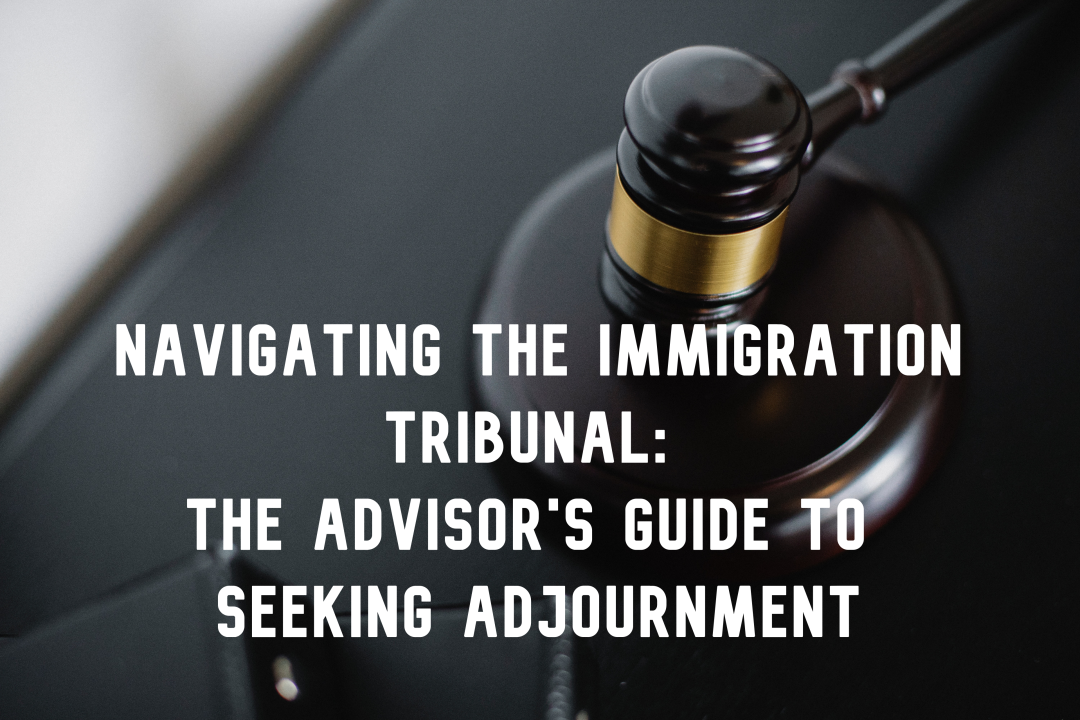For over a decade I have been working in the field of immigration and human rights. I am fortunate enough to work on a vast array of cases including many appeal matters. I have seen many immigration advisors and consultants have an unruly amount of reliance on counsels and barristers when it comes down to matters related to immigration appeals and tribunal procedures.
The reality is barristers do play a significant role but the immigration advisors/solicitors do have their part to play. Sadly many of these advisors are either oblivious to the Immigration Tribunals procedures or daughter by them. No two cases are similar. Each case needs its own strategy. Today I will write about a case and through this I will highlight to seek ‘adjournment’ to the immigration tribunal and of course highlight the relevant laws.
I had a client named “X”. At the time of instructions, he motioned that he previously had one conviction based on a drug-related offence. He was deported twice. He was married with two children. His wife was an EU citizen, as were his children. We made an application for him based on his partner. We disclosed the previous offence and deportation, and of course, the subsequent clandestine entry to the UK. The application was approved. However, there was a mistake on his BRP card. I got in touch with the Home Office, and instead of rectifying the mistake, they withdrew the visa that was granted. On the basis that the client had not one but two previous drug-related offences. The SSHD has decided to withdraw the leave to remain. This decision came with an appeal right. Of course, I appealed against the decision. For this article, I will not go deep into the grounds of appeal. However, as anyone would understand, the appeal grounds included his family-life in the UK. The best interest of the children. Submissions about how he is a changed person and the fact that he has served his sentences, etc. I was waiting for the IAC FtT direction as to the hearing date. However, in the most dramatic turn of events, I received a call from the client’s partner, notifying me that the client had been arrested for possession of drugs. Soon I got in touch with his criminal defence lawyer and requested documentation and details of the nature of the offence he was arrested for. I found out he was arrested during an operation against organised crime, and “X” was under surveillance for many months preceding the arrest. On or around this time, I received directions from the IAC FtT for the hearing on his immigration matter. I immediately got in touch with the tribunal and requested to adjourn the hearing as the outcome of this criminal matter was ‘material’ to his immigration matter.
It’s not complicated to understand that if he was acquitted, the grounds of appeal would have been sustained. However, if he were found guilty and convicted, then my submission about him being a changed person and my argument about the best interests of the children would be blown out of the water. Therefore, the outcome of the criminal case is extremely relevant. I also served the request for an adjournment on the respondent (SSHD), as she was way within her right to oppose this. However, the adjournment was granted.
As a lawyer, you must understand and respect the fact that the courts are operating with finite resources, you owe your duty to the court, and seeking adjournment ‘must’ always be based on valid and legitimate grounds.
In the case of Nwaigwe (adjournment: fairness) [2014] UKUT 00418 (IAC) (discussed in a previous blog post), the Upper Tribunal set out the importance of considering whether a refusal to accede to an adjournment request for an immigration appeal would deprive the affected party of his right to a fair hearing. The key issue is, therefore, fairness, and if an adjournment refusal is unfair, this could amount to an error of law.
Further guidance is provided by Mr. Michael Clements, the president of the First-tier Tribunal (IAC), in Presidential Guidance Note No. 1 of 2014. This makes it clear that applications to adjourn immigration appeals should be considered on their own merits, and all factors brought to the Tribunal’s attention must be examined.
The Tribunal Procedure (First-tier Tribunal) (Immigration and Asylum Chamber) Rules 2014 under the came management powers Sec 4 (3) (h) The tribal has the power to adjourn a hearing.
The Asylum and Immigration Tribunal (Procedure) Rules 2005 Sec 21 deals with the rules regarding adjournment.
It provides:
21.—(1) Where a party applies for an adjournment of a hearing of an appeal, he must—
(a) if practicable, notify all other parties of the application;
(b) show good reason why an adjournment is necessary; and
(c) produce evidence of any fact or matter relied upon in support of the application.
(2) The Tribunal must not adjourn a hearing of an appeal on the application of a party, unless satisfied that the appeal cannot otherwise be justly determined.
(3) The Tribunal must not, in particular, adjourn a hearing on the application of a party to allow the party more time to produce evidence, unless satisfied that—
the evidence relates to a matter in dispute in the appeal;
(b) it would be unjust to determine the appeal without permitting the party a further opportunity to produce the evidence; and
(c) where the party has failed to comply with directions for the production of the evidence, he has provided a satisfactory explanation for that failure.
(4) Where the hearing of an appeal is adjourned, the Tribunal will fix a new hearing date, which—
(a) shall be not more than 28 days after the original hearing date, unless the Tribunal is satisfied that because of exceptional circumstances, the appeal cannot justly be heard within that time; and
(b) shall, in any event, be not later than is strictly required by the circumstances necessitating the adjournment.
Also, in the submission requesting an adjournment, as a professional courtesy, you should always highlight the procedure rules. In my case, I have highlighted that pursuant to Sec. 21 SS (a), (b), and (c), I have noticed the SSHD. There is a good reason why the adjournment is necessary, i.e., the outcome of the criminal proceedings is relevant to the immigration matter at hand and has produced evidence. Also, I made a submission that the client is innocent until proven guilty; therefore, it would be unjust to proceed with the hearing without having the verdict of the criminal matter.
Finally, I submitted that Sec. 41 SS (4) (a) must not apply here because the hearing should be adjourned until the criminal matter is decided, which may take a few months, and therefore Sec. 41 SS (4) (b) applies in this case as it would need longer than 28 days.



